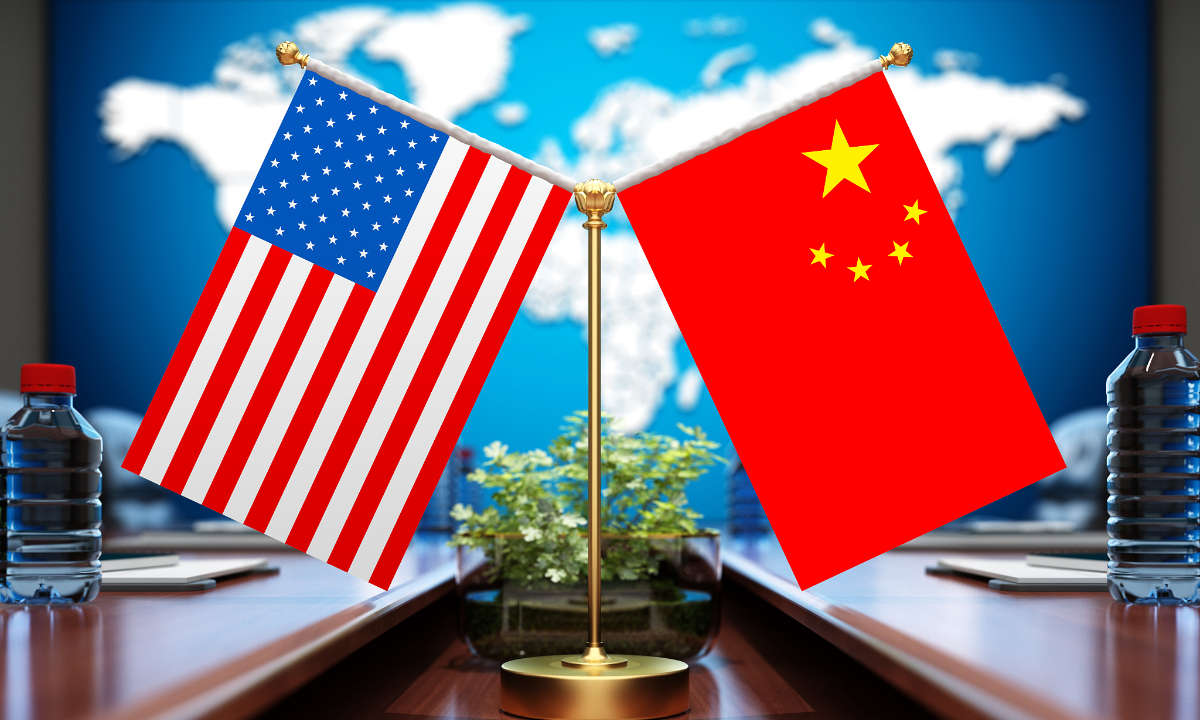
China US Photo:VCG
There have been multiple media reports that a meeting of the China-US Financial Working Group was held in Shanghai on Thursday and Friday. This was the fifth bilateral meeting since the two countries agreed to establish two economic and financial working groups in September last year. The New York Times said the meeting aims to strengthen communication and "discuss ways to maintain economic and financial stability." The meeting focused on issues such as macroeconomic and financial stability, the International Monetary Fund and capital market management. This is particularly urgent and important at a time when the international order is facing challenges and China-US economic relations are tense.
This is another exchange between China and the US in the economic, trade and financial field following the visit of a high-level US business delegation to China. Judging from the topics discussed, it shows the US attempt to have dialogue and coordination with China on financial stability and to respond to potential economic issues. At the same time, it highlights the importance of ensuring global economic and financial stability under the current complex situation. The willingness for dialogue and coordination shown by both parties is also pursuit of stability amid the recent increase in global economic and financial risks and tensions.
The importance of China and the US as the world's top two economies in the global economy cannot be ignored. Economic and financial cooperation between the two countries has a profound impact on the global economic trajectory. If economic and trade relations between the two major countries remain stable, the global economy will surely benefit. The original intention of establishing the China-US Financial Working Group and the China-US Economic Working Group was also to "sit down and talk" through this platform. In the previous four meetings of the China-US Financial Working Group, the two sides have had professional, pragmatic, candid and constructive discussions on the two countries' monetary policies and financial stability, financial regulatory cooperation, anti-money laundering and anti-terrorist financing, financial infrastructure and other issues.
We have also noticed that many foreign media, when reporting on the China-US Financial Working Group dialogue, mentioned the current trade tensions faced by China and the US. In particular, some US officials continue to make erroneous remarks on issues such as overcapacity in an attempt to put pressure on Beijing, exaggerating the risks that so-called Chinese macroeconomic imbalances and overcapacity pose to the global economy. It is hoped that through this dialogue, the US members of the working group can objectively and comprehensively understand China's attitude and policies in reforming its financial system and participating in global financial governance and cooperation, creating space for the continued development of pragmatic dialogue between the two countries.
In addition, talking about the current global financial risks and the impact of macroeconomic imbalances on countries in the world, the biggest uncertainty is undoubtedly still the US itself. The Federal Reserve's previous act of priming the pump has caused inflation, which has become a Sword of Damocles hanging over the global economy. Uncertainty over whether or not to cut interest rates continues to disturb the global stock market, bond market and foreign exchange market. Furthermore, the US national debt exceeding $35 trillion has also greatly increased global concerns about financial stability. Earlier this year, the IMF gave rare criticism of the US for unsustainable fiscal policies that undermine global financial stability.
Just this week, hundreds of lawyers from around the world jointly sent a letter to US President Joe Biden, calling on the US to end its use of widespread unilateral economic and financial sanctions, saying they lead to economic instability, hunger and reduced access to medicine and essential goods. "We consider the unilateral application of certain economic sanctions to constitute collective punishment." Sanctions have not only caused instability and poverty in many countries such as Venezuela and Cuba, but also plunged the people into living difficulties, and even threatened their survival. The Washington Post previously stated bluntly that sanctions "have become an almost reflexive weapon (of the US) in perpetual economic warfare." How the US effectively responds to these global concerns is equally important to maintaining global financial stability.
China's attitude to maintaining global financial stability is consistent. The Third Plenary Session of the 20th Central Committee of the CPC emphasized the need to actively participate in international financial governance. When it comes to developing relations with the US in all aspects, including finance, China has been steadfast in its principles of mutual respect, peaceful coexistence, and win-win cooperation. This is also the key to why China and the US can sit down, talk and talk well. It is hoped that the US can meet China halfway, truly make responsible efforts to maintain global financial stability, and take the initiative to assume the responsibility of a major country in global economic governance.




